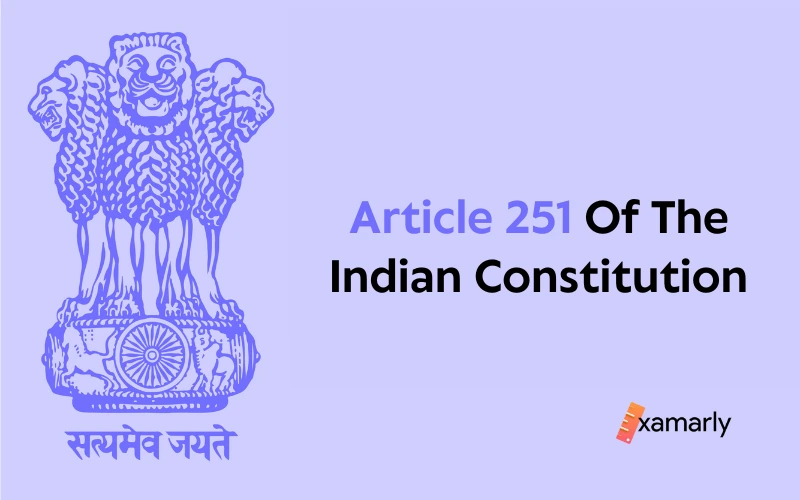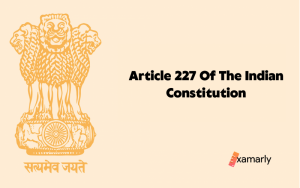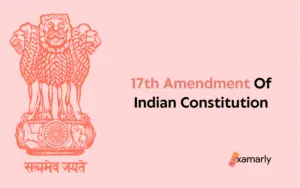An Overview
Have you ever wondered who has the upper hand between the Parliament and the Legislature of a State in terms of authority and power? Which government body out of these these holds more control when it comes to implementing laws that might be in contradiction to each other?
You landed at the right place. This article holds the answers to these questions.
Article 251 of the Indian Constitution was formulated to address the difference that may arise due to the inconsistency between laws. It refers to the laws introduced by the Parliament and the Legislature of States.In this case, the laws made by the Parliament are under the provisions provided by Articles 249 and 250 of the Indian Constitution.
Give a patient reading to this detailed writeup on Article 251 of the Indian Constitution and get to know how does the provision of this article help in dismissing the inconsistency between the laws made by the above-mentioned government bodies.
- An Overview
- What Does Article 251 Of The Indian Constitution Talk About?
- Explanation Of Article 251 Of The Indian Constitution
- Summing Up
- FAQs Related To Article 251 Of The Indian Constitution
- Which Articles Of The Indian Constitution Find A Mention In The Provision Of Article 251 Of The Indian Constitution?
- What Is The Purpose Of Article 251 Of The Indian Constitution?
- How Are Articles 249 and 250 Related To Article 251 Of The Indian Constitution?
- Does Article 251 Of The Indian Constitution Have Any Clauses?
- Which Other Article Of The Indian Constitution Declares A State Law Null When It Clashes With A Union Law?
What Does Article 251 Of The Indian Constitution Talk About?
The following paragraph has been quoted from the official document of the Constitution of India. The given text is held as Article 251 of the Indian Constitution. It reads as follows:
Nothing in articles 249 and 250 shall restrict the power of the Legislature of a State to make any law which under this Constitution it has power to make, but if any provision of a law made by the Legislature of a State is repugnant to any provision of a law made by Parliament which Parliament has under either of the said articles power to make, the law made by Parliament, whether passed before or after the law made by the Legislature of the State, shall prevail, and the law made by the Legislature of the State shall to the extent of the repugnancy, but so long only as the law made by Parliament continues to have effect, be inoperative.
Explanation Of Article 251 Of The Indian Constitution
Let us now try to understand the provision of Article 251 of the Indian Constitution in a clear and concise manner. The article has been explained in details below.
Article 251 explains that the Legislature of a State has been granted certain authority and special powers by the Constitution of our country. Due to the rendering of this power upon it, the Legislature of a State can make laws. However, the provisions mentioned in Article 249 of the Indian Constitution and Article 250 of the Indian Constitution cannot limit the power of the Legislature of a State.
Articles 249 and 250 renders power on the Parliament to make laws. A point to be noted here is that if the Legislature of a State introduces any such law that is in disagreement to any provision held by a law that has been made by the Parliament, then in such a case it is the law made by the Parliament that will be held valid as it is more powerful. It does not matter which government body out of the two passed the law first.
However, the law made by the Legislature of a State will not be valid or not functional only till the time the law made by the Parliament is being implemented and having effect. As soon as the law made by the Parliament reaches expiration of its time period, then the law made by the Legislature of a State shall have effect from then.
Summing Up
We learnt from Article 251 of the Indian Constitution that there is rendering of power on the Parliament under Article 249 and Article 250 of the Indian Constitution to make laws.
In a nut shell, the article provides that the provisions contained in Articles 249 and 250 cannot hinder the Legislature of a State from making any law that the Constitution gives it the power to make. However, the Parliament has the power to make laws under either of the two articles. If any part of a law made by the Legislature of a State is in conflict with a law made by Parliament, then the law made by Parliament will take precedence. This would be irrespective of whether it was passed before or after the law made by the Legislature of the State.
You Might Also Like:
| Article 253 Of The Indian Constitution | Article 252 Of The Indian Constitution |
| Article 248 Of The Indian Constitution | Article 247 Of The Indian Constitution |
FAQs Related To Article 251 Of The Indian Constitution
Which Articles Of The Indian Constitution Find A Mention In The Provision Of Article 251 Of The Indian Constitution?
Article 249 of the Indian Constitution and Article 250 of the Indian Constitution have been mentioned in the provision that is contained in Article 251 of the Indian Constitution.
What Is The Purpose Of Article 251 Of The Indian Constitution?
The purpose behind formulating Article 251 of the Indian Constitution was to dismiss the inconsistency that may arise when the Parliament and the Legislatures of State introduce laws for the same thing. Under the provisions of Article 249 and Article 250, the authority rendered on the Legislature of a State cannot be challenged.
The Parliament has exclusive powers to make laws which might be in contradistinction to the laws made by the Legislatures of States for the same purpose. In cases, where there is a clash between the laws of these government bodies, Article 251 of the Indian Constitution provides a middle ground. However, it is the law of the Parliament that is more powerful and prevails in such a case.
How Are Articles 249 and 250 Related To Article 251 Of The Indian Constitution?
Article 251 of the Indian Constitution provides that the provisions of Article 249 and Article 250 of the Indian Constitution cannot limit the authority of the Legislature of a State from making laws. However, in case where the Parliament makes laws for the same purpose, the law introduced by the Legislature of a State loses its validity till the time the law made by the Parliament is being implemented. The powers of Parliament are greater in matters of flaws made.
Does Article 251 Of The Indian Constitution Have Any Clauses?
No, there are no clauses included in Article 251 of the Indian Constitution.
Which Other Article Of The Indian Constitution Declares A State Law Null When It Clashes With A Union Law?
Besides Article 251, Article 254 of the Indian Constitution contains provisions that declare a State law null and void. This happens in cases wherein inconsistency between Union law and State law is observed. As the latter has more agency, it prevails over the former.






